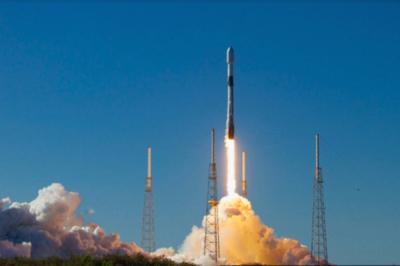Sat, Jan 15, 2022
SpaceX Launch Delivers 44 SuperDove Satellites
Planet, an ecological space surveillance company, has successfully launched their Flock 4X satellite cloud, adding 44 to their fleet of roughly 200 already in orbit.

The delivery was made in conjunction with SpaceX by sending the new additions aboard a Falcon 9X, bringing its track record with Planet up to 127 satellites across 8 launches. The new mission was the first under a recent multi-year, multiple launch rideshare agreement between the two.
Planet said that contact was quickly made with their satellite cloud additions, establishing connections within minutes. The constellation allows Planet to obtain daily insights about the Earth's resources and global events under the firm's PlanetScope program. The company boasts its fast-paced, rapid construction and just-in-time assembly prior to launch, saying their procedures allow continuous uninterrupted innovation up to the very last moment before shipment to the launch site. Planet's constellation is one of the largest assemblies of Earth observation satellites in history, bringing in prodigious amounts of medium and high resolution data over the preceding decade. Planet says that 1,700 images for every portion of Earth's landmass have been accumulated, allowing interested customers to see continuous, up-to-date PlanetScope imagery with a solid foundation of prior ground conditions for long term trend analysis.

Planet says that their rapid growth is only possible with recent improvements to the technology in every facet of the space industry. "Over the last 10 years, rocket launches have dropped in price and increased in frequency while satellites have dramatically decreased in size, allowing for greater numbers of satellites to be launched on each rocket. The unprecedented amount of Earth imaging data our entire fleet collects enables global analytics of planetary activity and resources. With Flock 4x, our data products will continue to provide high-cadence Earth insights for governments, NGOs, and companies working in sustainability, disaster relief, financial management, and security," said the company in the days leading up to the launch.
More News
“Honored to accept this mission. Time to take over space. Let’s launch.” Source: SecTrans Sean Duffy commenting after President Donald Trump appointed U.S. Secret>[...]
Permanent Echo Radar signals reflected from fixed objects on the earth's surface; e.g., buildings, towers, terrain. Permanent echoes are distinguished from “ground clutter&rd>[...]
Aero Linx: European Hang Gliding and Paragliding Union (EHPU) The general aim of the EHPU is to promote and protect hang gliding and paragliding in Europe. In order to achieve this>[...]
Glider Encountered A Loss Of Lift And There Was Not Sufficient Altitude To Reach The Airport Analysis: The flight instructor reported that while turning final, the glider encounter>[...]
Airplane Climbed To 100 Ft Above Ground Level, At Which Time The Airplane Experienced A Total Loss Of Engine Power On May 24, 2025, at 1300 eastern daylight time, an Aeronca 7AC, N>[...]
 Aero-News: Quote of the Day (07.11.25)
Aero-News: Quote of the Day (07.11.25) ANN's Daily Aero-Term (07.11.25): Permanent Echo
ANN's Daily Aero-Term (07.11.25): Permanent Echo ANN's Daily Aero-Linx (07.11.25)
ANN's Daily Aero-Linx (07.11.25) NTSB Final Report: Schweizer SGS 2-33A
NTSB Final Report: Schweizer SGS 2-33A NTSB Prelim: Aeronca 7AC
NTSB Prelim: Aeronca 7AC




